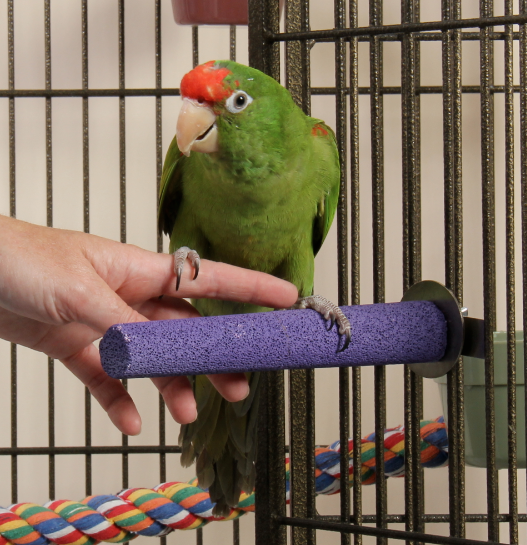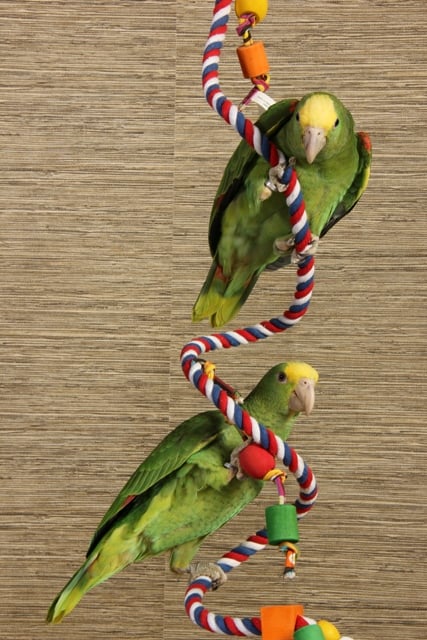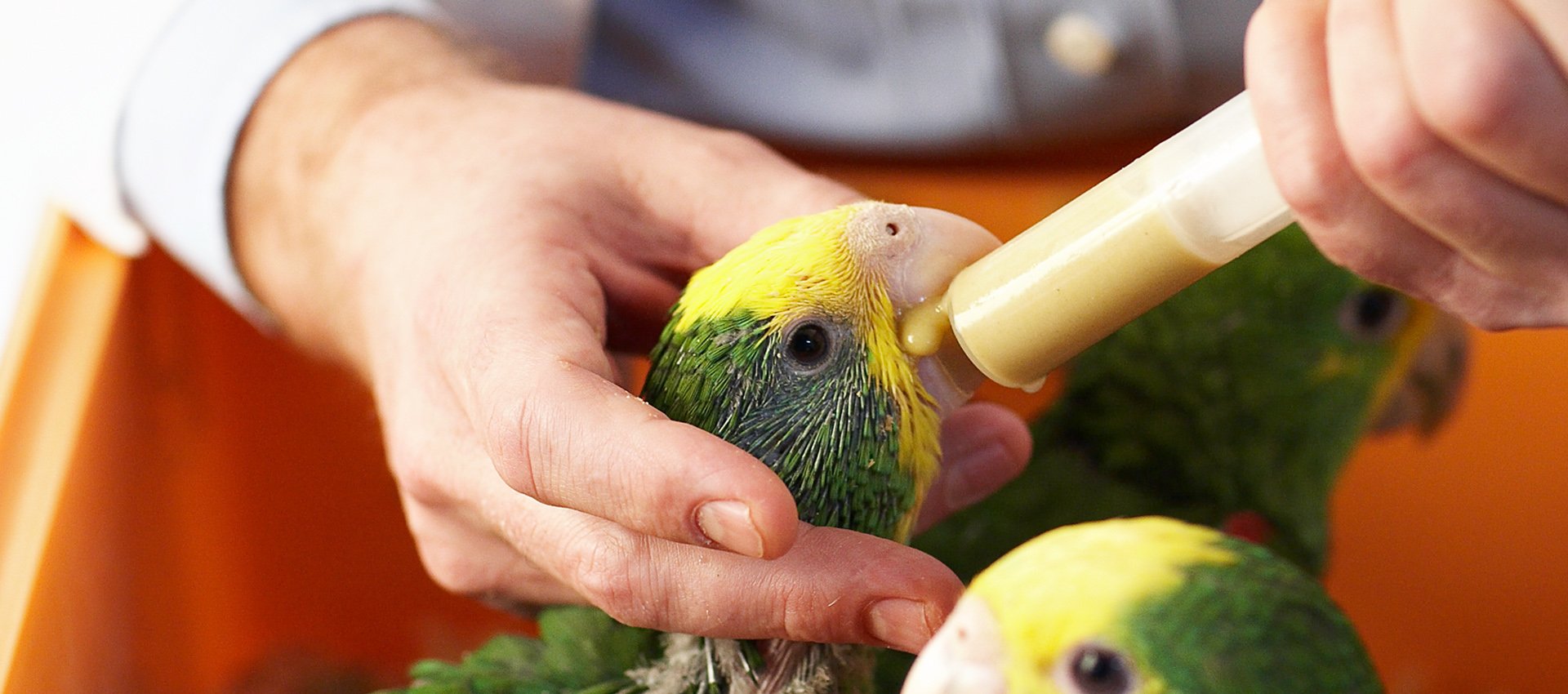Your cart is currently empty!

HARI Official Brand Site

This article I will address the challenges that you may face when bringing your first “human” baby into the home without making your parrots find a new one!
I have been working with birds and bird people since 1989 in the Southern Ontario area. I started out with wild-caught parrots before the availability and popularity of domestically bred, hand-raised babies took off. For several years I specialized in training people and “taming” (I hate that word!) parrots, previously owned as well as those just out of quarantine.
I am proud that I was able to achieve my goals of giving many of these scared, misunderstood animals a quality of life they may not have known, and teaching countless people to cherish and respect these unique and loving creatures.
Soon after captive bred babies became available, I worked exclusively on raising well-socialized parrots and helping people overcome behavior difficulties or adjustment challenges with their birds. Although the prices were sky high and wild parrots were cheap, I made it my mission to educate anyone willing to listen (and some who weren’t) on responsible parrot ownership and the need to support captive breeding programs by purchasing only birds bred in Canada for pets. It is for this reason that I have worked in the pet industry all these years. There seems to me that there is no better arena to introduce and teach people than in this environment.

Over the years, I have had great opportunities to learn from veterinarians, breeders, nutritionists, behaviorists and companion parrot owners. Like you, I have often needed help in understanding the needs of my flock. After all those who think they know it all probably know very little, and definitely know less than our parrots! For the past several years, I have worked as a private behavior consultant using my belief that it is us humans that need to be trained to live with parrots and that with proper guidance, reasonable expectations as well as love and respect everyone can have a Superior Parrot! In this article I will address the challenges that you may face when bringing your first “human” baby into the home without making your parrots find a new one!
I can’t tell you how many times I have been asked to find a new home for a bird when a couple realizes they are expecting.
I ask: what were you expecting when you acquired a parrot? You knew they were long-lived and demanding right? You knew they made lots of noise and a little mess right? What makes your human baby any different? Why the stress about your parrot when a human is a lot more trouble?! I realize that in certain extreme circumstances it may be necessary to find a new home for your bird when a child enters the picture, but why give up before trying? Of course, this could be used as an excuse to get rid of a misunderstood bird. If that is the case then go ahead, and find your bird a loving home and forget about putting a price on him. Your birds were your family before now, and they can remain with you and yes, all of you can live together in harmony, if not in peace.
I write this with great authority; after all I did manage to keep a semblance of sanity when I brought my daughter into the world. A world, which consisted of 2 amazons, 2 conures, a hawkhead, and an African red belly! Not to mention a husband, but that’s another story! I never once considered giving up my feathered children before Alanna was born, but soon after, I was a paranoid wreck worrying every waking moment about psittacosis, dander, noise, and of course the day when a bird would attack my child and cause permanent disfiguration! Where would I find the time to have a shower, never mind clean six bird cages? How could I possibly spend enough quality one on one time with each bird when all I seemed to be doing was feeding a squalling infant? How could I be a good mother to anyone or anything? Time to calm down! RELAX! The baby’s gonna cry, (and get sick) whether or not you have parrots, and the parrots are not going to be happier usurped from their home. People manage to have a new child when they have dogs, cats, a job or other children. You and your parrots will manage too!
If you haven’t already, (shame on you!) have a full veterinary check up done. This new life will be stressful for your bird too so make sure that they are strong and healthy before the alien arrival. Get your birds screened for psittacosis and treated now. Please don’t panic, just ask your vet!
If you only have one bird, consider getting another. I have a saying, “birds are like potato chips, you can’t just have one!” You will be less guilt ridden about the lack of face time your bird receives from you if he has some birdy else to communicate with when you are busy. Remember that birds are a flock animal and introduce a feathered member now.
If your bird is lacking in manners you’d better get on move now, start teaching simple commands, and establish routines. The best way to ensure that you will always be able to control your bird (especially one in overload mode) is to «perch train». By teaching your bird to promptly step up onto a hand held perch when asked you avoid countless power struggles and bites.
Talk to mothers of more than one child and ask them to help you. I don’t mean physically but by mentoring you about all your new paranoia’s and psychoses. You will get through this and trust me you will regret giving up your birds for a relatively short-lived period of panic. It really is ok for your birds to be unhappy for a bit. They too will adjust easier to the new arrival than they will a new home.
Now would be a great time to start inviting over the neighborhood teens to interview or train for future babysitting jobs! They can get to know Junior under your watchful eye, while you spend time with your bird.
Do not be afraid to expose your children to the antics and noise of your bird. It is better for your baby (and therefore you) to learn to fall asleep and stay that way with a little noise than nothing but dead quite. I used a power baby swing plopped right between my 2 amazons’ cages for nap time. The birds got used to the baby; they learned not to feel threatened. They also learned to cry to get my attention. Try to include your bird in the daily activities with the baby. Get a mobile play stand so you can move the bird around with you. A lot of behavior problems I see in these situations are due to the parrot feeling left out, or due to people giving their bird too much unsupervised time out of the cage on their own.
As with ALL family pets, you must never leave your bird and child alone together. Teach your children from an early age not to use the cage as a walker or climber. I believe no family is complete without a pet to help teach responsibility, respect, boundaries, and even loss. Accidents will happen and there may come a day that your child may get bitten. Chances are really good though that unless you are not supervising or careless about reading your bird’s mood, no serious harm will occur and a valuable lesson will be learned. Remember that this could be the case with a dog or cat as well. We have all heard fatal horror stories about a family pet gone bad. It is highly unlikely that your bird will cause anyone’s death. If you are concerned about an unclipped bird, give him a slight trim to temporarily take some of the wind out of his sails.
Expect this adjustment to take time. I would not consider poor behaviour a problem until you have given a consistent effort for several months. If you and your bird do not adjust well to this new lifestyle, please call in a behavior consultant for an in-home assessment. There may be underlying issues surrounding your bird’s behavior that have little to do with the baby. Another experienced person can help you determine how to handle severe problems and preserve your relationship. Another set of eyes can often see things more clearly. We sometimes have a tendency to become complacent and overlook what others see as obvious.

It is my hope that all parrot parents only give up their birds in extreme circumstances but remember; if you do not want to make this effort or if after consistently trying you can no longer give your birds the understanding and love that once was theirs alone, it is probably better that you do find them a better place. Almost everyone who gives up their bird during the stressful adjustment time of a newly arrived baby regrets it terribly eventually, only to get another bird when the children are a few years older. We have a much larger responsibility than pet ownership at stake here, those of us lucky enough to share their hearts and homes with parrots may be ultimately responsible for the survival of the species. Now go look into those dilating eyes of your feathered child and do the best that you can for him, always.
By Janna Goodyear-Price

Achieve this is by providing them with quality toys that are specifically designed for functional play.